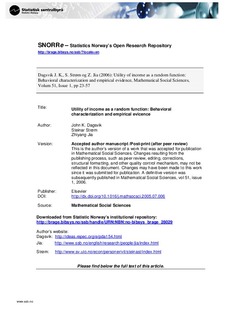Utility of income as a random function: Behavioral characterization and empirical evidence
Journal article, Peer reviewed
Permanent lenke
http://hdl.handle.net/11250/178100Utgivelsesdato
2006Metadata
Vis full innførselSamlinger
Originalversjon
Mathematical Social Sciences, volum 51, issue 1, January 2006, pp 23-57Sammendrag
The paper proposes a particular approach to model the utility of income. We develop a theoretical
framework that restricts the class of admissible functional forms and distributions of the random
components of the model. The theoretical approach is based on theories of probabilistic choice and ideas
that are used in modern psychophysical research. From our theoretical framework, we obtain the empirical
model and the corresponding likelihood function. The empirical analysis is based on a bStated PreferenceQ
survey. The model fits the data quite well. Finally, we discuss the concept of cardinality and the
implications for consumer demand relations.
Beskrivelse
This is the author's version of a work that was accepted for publication in "Mathematical Social Sciences". Changes resulting from the publishing process, such as peer review, editing, corrections, structural formatting, and other quality control mechanism, may not be reflected in this document. Changes may have been made to this work since it was submitted for publication. A definitive version was subsequently published in Mathematical Social Sciences, volum 51, issue 1, January 2006, pp 23-57. DOI: http://dx.doi.org/10.1016/j.mathsocsci.2005.07.006
